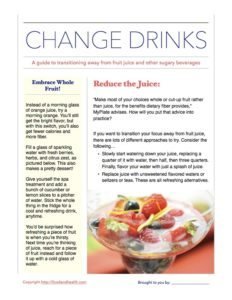The Health Impact of Drinking Juice
Did you manage to see the article, Confessions of a Juice Drinker? In it, Cheryle Jones Syracuse, MS, Professor Emeritus at The Ohio State University, explored her friends' shocked reactions to her morning glass of orange juice.How do you feel about orange juice and other 100% juice beverages?Whether you're all for them or totally against them or somewhere in between here's another perspective to consider, from James J. Kenney, PhD, FACN...
Orange juice has more calories and sugar ounce for ounce than Coke and no more satiety per calorie. Consuming fruit juice as perhaps 1/4 to 1/3 of one's fruit servings may be okay for most active, normal weight individuals, although even for them the result may well be a somewhat higher serum triglyceride level and cholesterol level than if they opted instead for whole fruit -- and that's assuming they gain no body fat.
For people who are inactive and struggle with their weight, especially those with the metabolic syndrome and particularly those with type 2 diabetes mellitus, drinking more fruit juice is a particularly bad idea as it will tend to promote weight gain and elevate blood lipids.
Fruit juice is best reserved for recipes like salad dressing or sauces where it will be consumed along with solid food. The optimal amount of fruit juice consumed as a beverage is none.
Now both MyPlate and the Dietary Guidelines for Americans assert that some juice daily is all right for good health, but both also emphasize the importance of choosing whole fruit most of the time.So, in light of this research, if you would like to help your clients moderate their juice consumption, then I have a brand-new handout for you!Here's a preview of the text, and if you like what you see, scroll down to the bottom of the page to get your free printable nutrition handout.Change Drinks: A guide to transitioning away from fruit juice and other sugary beverages“Make most of your choices whole or cut-up fruit rather than juice, for the benefits dietary fiber provides,” MyPlate advises.How will you put that advice into practice?If you want to transition your focus away from fruit juice, there are lots of different approaches to try. Consider the following…
- Slowly start watering down your juice, replacing a quarter of it with water, then half, then three quarters. Finally, flavor your water with just a splash of juice.
- Replace juice with unsweetened flavored waters or seltzers or teas. These are all refreshing alternatives.
- Instead of a morning glass of orange juice, try a morning orange. You’ll still get the bright flavor, but with this switch, you’ll also get fewer calories and more fiber.
- Fill a glass of sparkling water with fresh berries, herbs, and citrus zest, as pictured at the top of the post. This also makes a pretty dessert!
- Give yourself the spa treatment and add a bunch of cucumber or lemon slices to a pitcher of water. Stick the whole thing in the fridge for a cool and refreshing drink, anytime.
- You’d be surprised how refreshing a piece of fruit is when you’re thirsty. Next time you’re thinking of juice, reach for a piece of fruit instead and follow it up with a cold glass of water.
Heeeeeeeeeere's the handout! For more information about the health impact of juice, don't miss the members-only post Juice Comparison Chart, which features a new printable nutrition handout just for you!And here are some other fantastic materials about drinks from the Nutrition Education Store![shopify embed_type="product" shop="nutrition-education-store.myshopify.com" product_handle="are-you-drinking-candy-sugar-awareness-poster" show="all"][shopify embed_type="product" shop="nutrition-education-store.myshopify.com" product_handle="dont-drink-your-calories-powerpoint-and-handout-lesson" show="all"][shopify embed_type="product" shop="nutrition-education-store.myshopify.com" product_handle="beverage-banner-and-banner-stand-24-x-62" show="all"]
For more information about the health impact of juice, don't miss the members-only post Juice Comparison Chart, which features a new printable nutrition handout just for you!And here are some other fantastic materials about drinks from the Nutrition Education Store![shopify embed_type="product" shop="nutrition-education-store.myshopify.com" product_handle="are-you-drinking-candy-sugar-awareness-poster" show="all"][shopify embed_type="product" shop="nutrition-education-store.myshopify.com" product_handle="dont-drink-your-calories-powerpoint-and-handout-lesson" show="all"][shopify embed_type="product" shop="nutrition-education-store.myshopify.com" product_handle="beverage-banner-and-banner-stand-24-x-62" show="all"]